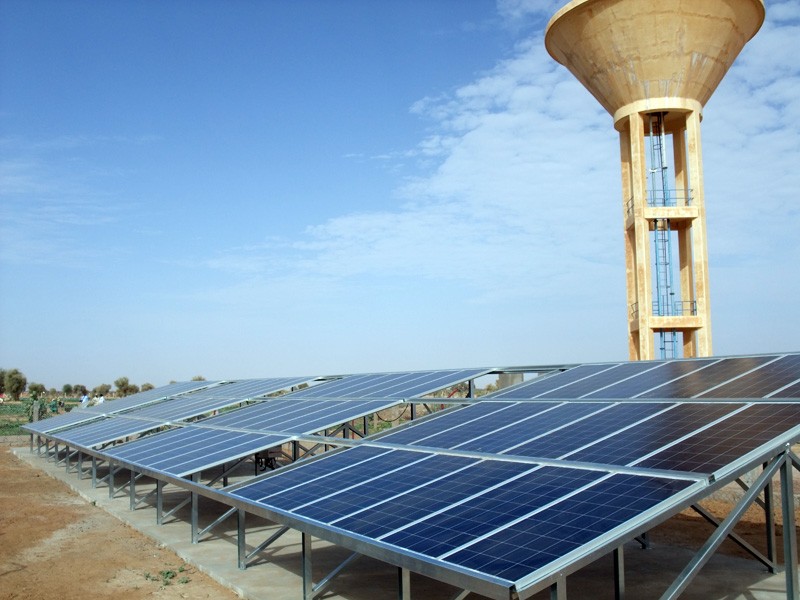If the COP 21 had taken place in Koudougou !
First of all a question , of special interest for Burkina's farmers, who have little information on the subject : « What does the COP 21 stand for ? » Answer : « It is the annual meeting of the Conference of the Parties », that is to say of countries wanting to take action on climate change.
I am well aware that Koudougou does not have the capacity to organise the COP 21, but I also know that for those responsible for climate change the actual venue of their meeting has a bearing on the results. At the COP 21 in Paris the poorest nations have a hard time making their voice heard. It is now 50 years since I arrived in Upper Volta. I have often shared the living conditions of peasants in villages without a school, without basic health care, without a telephone line. (It was not until 1997 that I was able to regularly use a telephone.) This is why I now wish to share my experience, confronting it with the current climate events and starting a series of 21 newsletters ( a hint at the ongoing COP 21) on issues related to the climate.
The series will come under the heading of « It is all connected », with another hint, this time at the letter of Pope Francis «Laudato Si » on the preservation of the planet.
Pope Francis's letter is not addressed solely to Christians, even though entire chapters directly speak to them. All those who care for the future of our planet ( Our Common Home in the words of the Pope) will find useful and relevant food for thought. I have singled out one particular statement underlying the entire document, notably from paragraph 137 : « It is all connected ».
137- Given that all and everything is closely , interrelated and that the present problems require and approach
including all the different aspects of the global crisis, I suggest that we
take a moment to look at the various components of an integral ecology,with its obvious
human and social dimensions..
It should be noted that at the time of writing this newsletter here in Koudougou we are on our 3rd day without water supply. No comment.I leave to you to see the connection of this to the wider issue of climate change.
To me personally the situation is not too bad, since we have built a mini water tower, as a safeguard against the all too frequent cuts. We actually let our neighbours come and draw water in our yard. But if the shortage continues our reserves will soon be depleted.
 Water tower and solar panels - The town of Koudougou has a severe shortage of back up water supply. I believe that the national water agency , ONEA, should build at least one water tower per urban sector, 10 in all, powered by solar energy. Generally speaking a simple pump, powered by electricity from solar panels, is often inadequately referred to as « solar pumps ». Nevertheless it is one of the best solar energy investments one can make, as it is much cheaper to pump up and store water (even as high up as 10 meters) in the daytime than to accumulate electricity in batteries, which whatever one does, will rarely last more than 3 years.
Water tower and solar panels - The town of Koudougou has a severe shortage of back up water supply. I believe that the national water agency , ONEA, should build at least one water tower per urban sector, 10 in all, powered by solar energy. Generally speaking a simple pump, powered by electricity from solar panels, is often inadequately referred to as « solar pumps ». Nevertheless it is one of the best solar energy investments one can make, as it is much cheaper to pump up and store water (even as high up as 10 meters) in the daytime than to accumulate electricity in batteries, which whatever one does, will rarely last more than 3 years.
I had intended to mainly « deal with my experiences with solar energy »,but the water cut has sent me off in a different direction. I will just quickly round up with an example which might seem trivial. In 1990 or 1991 I was working with a computer that I could run on 12 volt. I had a small solar panel and a lead battery from a car (less expensive than the laptop battery I use today). I could connect my computer directly to the battery, plus a small size manual scanner.
However, I recently presented a farmer friend in a village with a laptop . For this I did not only have to buy a solar panel and a battery, but also a converter to transform the energy from the battery into alternating current, then turning the alternating current into the direct current required by the computer (19 volt I believe).
In addition I wanted to provide my friend with a printer. But ink jet printers are not suitable for our long dry season. I was looking for a small laser printer, of the kind which recently has become affordable and comes with a guarantee of a maximum power consumption of 300 Watt. I had an even stronger 600 W converter, but I was still unable to print the first page. I made several attempts with 300 W printers, all in vain.
The important detail, left out by the manufacturer, was the consumption peak at the start, for warming up or printing the first page. There are printers which can do this in as little as 6 seconds. But on the market there was no printer available that came even near a 1 minute span, at which the peak consumption would not have gone beyond 400 W.
All this to show that it is difficult, sometimes even impossible, to find advanced technology products suitable for our different countries. Therefore I call upon all those who care for the future of our planet to ask themselves : What can be done to ensure availability of products that are truly adapted to the needs of the environment (and economy) of our country ?
One last point : I would like to acquire one or two electric bicycles (for a start) for SEDELAN . I plan to import them from China, which has a wide experience in the field. But which material would be adequate ? I would be grateful to all who have an insight in this matter to contact us. The intention is to recharge the batteries with solar panels. It would be necessary to order a second battery from the outset, to avoid leaving the bicycles idle for too long a time.
Our next newsletter will be number 500 !! It will nearly coincide with my arrival in Upper Volta / Burkina Faso in 1965 - 50 years ago !!
In the meantime I invite you to have a look at our new website
and to subscribe to this new publication.
Koudougou, November 30 2015
Maurice Oudet
Editor-Director-President, SEDELAN










